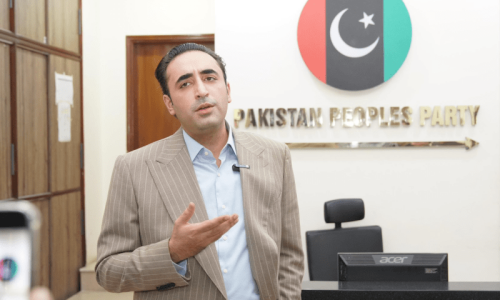ISLAMABAD, Jan 10: Prime Minister Shaukat Aziz on Monday directed relevant government departments to make preparations on priority basis for seeking the World Bank intercession to resolve the Baglihar hydropower project dispute with India, it is reliably learnt.
The move has come two days after talks with India failed to resolve the dispute as both sides stuck to their positions. Pakistan maintains that the Baglihar dam, being constructed by India on river Chenab in occupied Kashmir, violates the 1960 Indus Waters Treaty but India asserts it does not.
Sources told Dawn that a high-level meeting presided over by Prime Minister Aziz at the PM House on Monday recommended that the case be referred to the World Bank for appointment of a neutral expert.
The World Bank brokered the bilateral water-sharing treaty and also stood as its guarantor. The treaty gives both countries the third-party option in case of a deadlock over any issue.
Water and Power Secretary Ashfaq Mahmood, who led the Pakistani delegation at the talks on the Baglihar dam issue in New Delhi last week, presented his report to the meeting. The crux of his report was that Pakistan had a sound case, the sources privy to the meeting toldDawn.
Attorney-General Makhdoom Ali Khan, who was also present at the meeting, maintained that Pakistan had a strong legal case and recommended that Article IX of the treaty be invoked.
The article provides for settling disputes through neutral experts or arbitration if they cannot be resolved between the two Indus Waters Commissioners.
A formal notification for the appointment of a neutral expert would soon be dispatched to the World Bank, the sources said. The request would go from the Pakistan Indus Water Commissioner to the World Bank president.
During the two-hour meeting, the prime minister was informed by Mr Mahmood that the Pakistani side made every effort to resolve the issue bilaterally but the Indian attitude remained inflexible. He said that India as usual wanted to buy time and further delay the process, the sources added.
"What they were offering was merely an eyewash and not a substantial adjustment in the design of the dam that could have paved the way for an agreement," the sources quoted the secretary as informing the meeting.
The meeting was also attended by other members of the delegation and senior foreign ministry officials. It is learnt that on Tuesday ambassadors of the European Union and other countries will be given a detailed briefing on Pakistan's next move on the Baglihar issue at the foreign office.
At the last round of talks, India took the stand that the Baglihar project was based on 'techno-economic' considerations, the sources said. However, it was pointed out by the head of the Pakistani delegation that it should have been guided by the provisions of the Indus Waters Treaty.
It is learnt that the Pakistani side maintained that the run of the river project did not call for a head 475 feet high and the project design should be based on low weir.
The Pakistani side is said to have argued that the calculation of pondage and firm power in the design was not consistent with the treaty. Moreover, it maintained that as per provisions of the treaty, the project design should be based on ungated spillways.
At the heart of the dispute is the design of the project which, according to Pakistan, provides for submerged gated spillways and, therefore, allows Indian control over Pakistani waters in breach of the water treaty.
Pakistan believes that the construction of a dam of such a magnitude would interfere with the flow of water. Pakistan's main concern is that the gated structure would provide India the capability to manipulate the flow of water to Pakistan's disadvantage.
One serious consequence is that it would arm India with the capability to cause acute water shortages in Pakistan. Experts warn that it could deprive Pakistan of up to 8,000 cusecs of water per day.
India has been dragging its feet on the Baglihar issue since 1992 when Pakistan first objected to its design. India has ignored Pakistan's repeated demands that it suspend work at the project site till the issue is settled.
Recent reports suggest that India has expedited work on the project and recruited hundreds of additional engineers for its early completion. The 450mw Baglihar hydropower project was launched in June 1999 and is expected to become operational by the end of this year or early next year.












































Dear visitor, the comments section is undergoing an overhaul and will return soon.